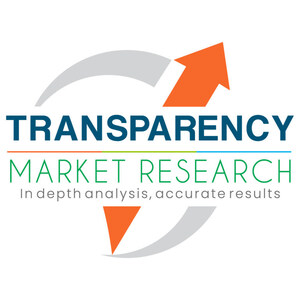Anti-snoring Devices & Snoring Surgery: Integration of IoT and Nanotechnology Will Drive Demand for and Sales of the Market, TMR Says
ALBANY, New York, July 7, 2016 /PRNewswire/ --
The presence of an increasing number of companies manufacturing and selling anti-snoring devices today has rendered the competitive landscape of the anti-snoring devices and snoring surgery market extremely fragmented, Transparency Market Research (TMR) finds. GE Healthcare, Philips Healthcare, Fisher & Paykel Healthcare, Medtronic plc, and ResMed, Inc. are not only the prominent players in the global anti-snoring devices and snoring surgery market but also account for a significant percentage share of the overall market. Although SomnoMed does not account for a major share in terms of percentage, its extensive product portfolio and robust market presence makes it a strong contender in the anti-snoring devices and snoring surgery market.
Download Research Brochure for Technical Insights: http://www.transparencymarketresearch.com/sample/sample.php?flag=B&rep_id=6910
A slew of recent acquisitions have enabled Medtronic to emerge as the largest revenue contributor when it comes to anti-snoring devices. The top three companies in the global anti-snoring devices and snoring surgery market - namely Medtronic, GE Healthcare and Philips Healthcare, contribute a whopping 93.69% to the entire revenue pie. TMR has observed that a surge in R&D activities has strengthened the position of these companies in the global anti-snoring devices and snoring surgery market.
TMR makes several key projections on the future outlook of this market.
Demand for low-cost and connected devices will gain speed
"The introduction of innovative devices is just as vital in gaining a competitive edge," says a TMR analyst. "Anti-snoring device companies have been increasingly focused on improving the performance of existing products. The miniaturization of sleep apnea devices is a recent trend driven by the integration of nanotechnology.
The demand for compact and low-cost devices has provided vendors a major opportunity. Case in point, Airing LLC. The medical device company launched a revolutionary disposable, battery-operated, and cordless micro-continuous positive airway pressure (CPAP) device in May 2015.
The large-scale proliferation of the Internet of Things (IoT) has penetrated the medical devices sector as well. The growing demand for connected and wireless devices as well as remote patient monitoring is reflected in the way an increasing number of anti-snoring devices companies are integrating IoT with their products. Medco Health is one such company. In February 2015, the medical device maker launched an innovative telemedicine assistance system that not only monitors the sleeping patterns of patients with obstructive sleep apnea disorder but also helps schedule doctors' appointments.
It has been observed that leading vendors have also been investing significant resources in enhancing the performance of anti-snoring devices to drive the acceptance and sales of anti-snoring devices.
Read More at http://www.europlat.org/tag/anti-snoring-devices-and-snoring-surgery-market
Companies will need to overcome lack of patient compliance to spur sales
The demand for anti-snoring devices and snoring surgery is being driven by a number of physiological factors. A surge in the incidence of obstructive sleep apnea, an increase in the number of people suffering from sleep deprivation and snoring, and an alarming prevalence of obesity have considerably fueled the need for anti-snoring devices. "People with obesity are four times more likely to snore compared to those of normal weight," states TMR based on its findings.
The development of state-of-the-art technologies by market players and a focus on extensive marketing have also enhanced the uptake of anti-snoring devices.
In contrast, a lack of patient compliance, certain side effects such as throat dryness and nasal congestion, ambiguity in handling the device have limited the use of anti-snoring devices among patients. The high price of these devices is also a major factor dampening the sales of the devices.
Competitive pricing of devices is likely to curb high revenue growth
The global market for anti-snoring devices and snoring surgery is projected to expand at a steady 3.9% CAGR from 2016 to 2024, with the market opportunity rising from US$16 bn in 2015 to US$22.7 bn by 2024. Continuous positive airway pressure (CPAP) devices rake in the highest revenue in terms of device. The opportunity of this device segment is forecast to increase from US$12.1 bn in 2015 to US$16.4 bn by 2024.
On the other hand, tongue stabilizing devices (TSDs) are likely to witness the highest growth, with sales rising from 32.81 mn units in 2015 to 51.54 mn units by the end of 2024. However, TMR states that the competitive pricing of these devices limits revenue growth.
The information presented in this review is based on the findings of a report by Transparency Market Research titled "Anti-snoring Devices and Snoring Surgery Market - Global Industry Analysis, Size, Growth, Trends, and Forecast 2015 - 2023."
About Us:
Transparency Market Research (TMR) is a U.S. based provider of syndicated research, customized research, and consulting services. TMR's global and regional market intelligence coverage includes industries such as pharmaceutical, chemicals and materials, technology and media, food and beverages, and consumer goods, among others. Each TMR research report provides clients with a 360-degree view of the market with statistical forecasts, competitive landscape, detailed segmentation, key trends, and strategic recommendations.
Contact:
Transparency Market Research
90 State Street, Suite 700
Albany, NY 12207
United States.
Tel: +1-518-618-1030
USA - Canada Toll Free: 866-552-3453
Email: sales@transparencymarketresearch.com
Website: http://www.transparencymarketresearch.com
Blog: http://www.tmrblog.com/




Share this article